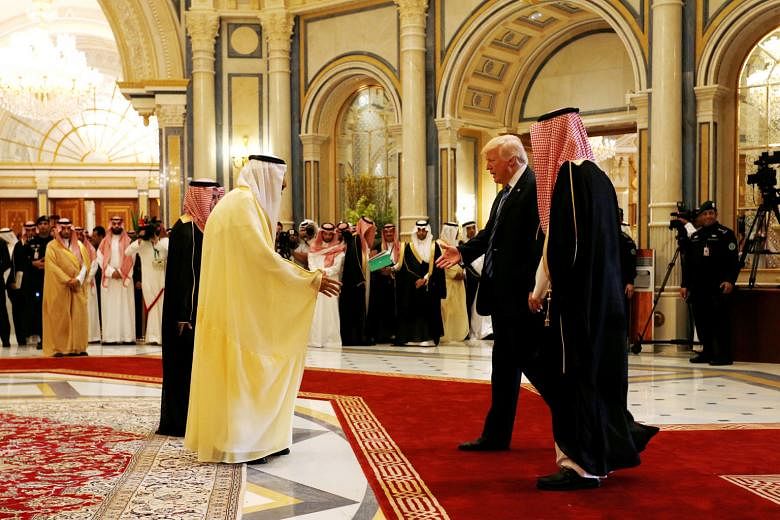The Washington Post's legendary former publisher Philip Graham famously described journalism as the business of writing the "first rough draft of history". This week, as President Donald Trump gave a historic speech in Saudi Arabia before the leaders of more than 50 Muslim-majority nations, journalism's first draft missed the history almost entirely.
While the media focused on the ephemeral questions - whether the President would use campaign rhetoric in a diplomatic setting, or how the trip would affect the Obama legacy - they largely missed the real drama of the moment: A titanic shift in US foreign policy occurring right before their eyes.
Mr Trump stood before an unprecedented gathering of leaders to do something far more significant than utter a single phrase or undermine his predecessor's record. He was there to rally the Muslim world, in his words, "to meet history's great test" - defeating the forces of terrorism and extremism. He did so in a way that no American president ever had before. While extending a hand of friendship to Muslim nations, he also issued them a clear challenge: To take the lead in solving the crisis that has engulfed their region and spread across the planet. "Drive out the terrorists and extremists," he urged them, or consign your peoples to futures of misery and squalor.
To find a comparably dramatic moment in the history of US foreign policy, we have to look all the way back to 1982. That June, 35 years ago next month, President Ronald Reagan stood in the Royal Gallery at the Palace of Westminster in London and called on the West to rally in defence of freedom and against communist aggression.
In that one speech, Mr Reagan predicted the fall of communism and reinvigorated the Western alliance. "We see totalitarian forces in the world who seek subversion and conflict around the globe to further their barbarous assault on the human spirit," Mr Reagan said. "What, then, is our course? Must civilisation perish in a hail of fiery atoms? Must freedom wither in a quiet, deadening accommodation with totalitarian evil?" Mr Reagan declared his speech a turning point in history - and it was.
On Sunday, Mr Trump, too, declared that his challenge would be a turning point, one way or another. And he posed to that assembly in Riyadh an equally dramatic choice. It was, he said, "a choice between two futures" - the path of civilisation, or the path of evil and death. "America is prepared to stand with you" in the fight against terrorism, Mr Trump pledged. "But the nations of the Middle East cannot wait for American power to crush this enemy for them. The nations of the Middle East will have to decide what kind of future they want for themselves, for their countries, and for their children."
Never before has an American president tried so clearly to unite the civilised world, including the nations of the Middle East and Africa, against the forces of terrorism.

Never before has an American president issued so direct a challenge to those nations to do more in the fight. And never before has an American president so plainly put the ultimate responsibility for eradicating terrorism on the nations of the region. In doing so, Mr Trump's speech implicitly repudiated the approaches of his two immediate predecessors and promised instead what he characterised as a "principled realism", based on a clear-eyed view of America's interests, security and limits.
That this decisive shift in US foreign policy occurred on a foreign trip within the first four months of the administration is all the more impressive. Mr Reagan didn't take his first international trip until well into his second year. And unlike president Barack Obama's early speech to the Muslim world in 2009, Mr Trump backed up his words with action.
The United States and Saudi Arabia signed a US$110 billion (S$152 billion) arms deal, the largest in US history, which will bolster the kingdom's ability to contribute to counter-terrorism operations across the region. This will reduce the burden on the US military and send a clear message that this administration takes the threat of Iran seriously. The agreements also included a new commitment to crack down on terrorism financing in the Persian Gulf states, as well as hundreds of billions of dollars' worth of Saudi investment in the US.
Journalists and Washington bureaucrats, who are so deeply embedded in the establishment that they can't see out of it, may see Mr Trump's call to action as a distracting sideshow from a status quo they can't imagine changing. And yet this week, it already has. Foreign leaders and the American people alike can see in this trip the core of a new, reality-based foreign policy.
WASHINGTON POST
- Newt Gingrich, a Republican from Georgia, was Speaker of the House of Representatives from 1995 to 1999. He served as vice-chair of the Trump transition team and is the author of the book Understanding Trump, scheduled to be released next month.

